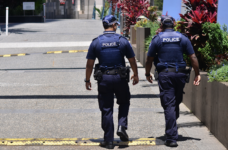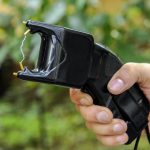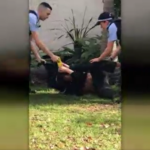Police Threaten to Taser Father at His Home Over Alleged Driving Offence

The Queensland Police Service (QPS) has come under fire for attending a father’s home and threatening him with a taser, over an alleged driving offence, which was later thrown out of court when police failed to produce any evidence.
Video footage of the incident depicts officers aggressively approaching the man at the gate of his home and accusing him of committing the traffic offence of unlicensed driving.
The man denies ever having done so and asks police to prove it, after which he attempts to shut his gate.
Police then see fit to enter the man’s property, as one of them draws his taser in a pistol-like manner and points it at the man.
A second officer then draws a taser before calling for backup, as the man stands still while his wife becomes increasingly distraught.
The level of aggression displayed by the officers might, in the absence of context and audio, have an observer believe they are approaching an armed and dangerous criminal.
Arrested and charged
The officers then handcuff and arrest the man, before charging him with unlicensed driving as well adding a charge of obstructing a police officer in the execution of duty for doing little more than standing on his own property.
The heavily armed officers are heard saying the man is lucky he was not charged with assaulting police.
Thrown out of court and costs ordered against police
When the case ultimately came before the court, the presiding magistrate dismissed both charges on the basis that police had failed to produce any evidence of any crime.
The QPS was ordered to pay the man’s legal costs; although, if past experience is anything to go by, the officers involved are unlikely to be disciplined over their conduct.
Indeed, the conduct of the police involved appears to clearly amount to an offence of common assault, as it is illegal for officers to use any more force than is reasonably necessary during such confrontations.
Needless to say, Queensland taxpayers will foot the bill for the misconduct of police – not the officers themselves.
Heavily armed thugs
Of course, the regular release of ‘police behaving badly’ raises concerns about lack of accountability and a toxic culture of aggression and bullying in police forces across the nation, as well as the apparent ‘shoot first and ask questions later’ displayed by these heavily armed ‘thugs’.
Normalisation of aggression
It also raises questions around police training and a heavy reliance on weapons such as tasers and capsicum spray, also known as ‘pepper spray’ in situations where it clearly is not warranted.
In New South Wales, tasers are classified as less-lethal weapons. This is recognition of the fact that they can, in fact, cause death.
In fact, police have tasered some of our most vulnerable – leading to their deaths. They have tasered mentally ill people – including those alone in their homes – killing them. They have tasered children as young as 12 years old in the back, and even pregnant women.
Indeed, police have even been known to seize mobile phones and delete footage of them tasering members of the public – thereby clearly committing the criminal offence of perverting the course of justice, with little or no consequences. They have fought to suppress evidence of mentally ill people being tasered, using taxpayer money to take cases all the way up to the Supreme Court.
When can police use tasers in NSW?
Tasers were originally introduced in Australia for use by specialist forces, but over time, they have become ‘standard issue’ for most officers, as an alternative to ‘lethal’ weapons and their use in everyday policing has become more ‘normalised’.
This has sparked concerns that tasers are not necessarily an alternative to a deadly weapon, but are used instead – in addition to deadly weapons – albeit in situations where firearms would not be justified.
Each jurisdiction around Australia has its own rules and regulations with regard to police use of tasers.
In New South Wales, under section 231 of the Law Enforcement (Powers and Responsibilities) Act 2002, a police officer may use such force as is reasonably necessary to make the arrest or to prevent the escape of the person after arrest, when exercising the power of arrest.
According to NSW Police Force guidelines, tasers may be discharged at the discretion of officers, following an assessment of the situation and where it is ‘reasonably necessary’. It gives officers the direction that tasers may be used to:
- Protect human life,
- Protect yourself or others where violent confrontation or violent resistance is occurring or imminent,
- Protect an officer(s) in danger of being overpowered or to protect themselves or another person from the risk of actual bodily harm, or
- Protect from animals.
But it’s a tragic fact that many officers choose to ignore these guidelines, acting as a law unto themselves with impunity.
Going to court for a traffic offence?
If you are going to court for a traffic offence, call or email Sydney Criminal Lawyers anytime to arrange a free first consultation with an experienced, specialist traffic lawyer who will accurately advise you of your options, the best way forward, and fight for the optimal outcome in your specific situation.






